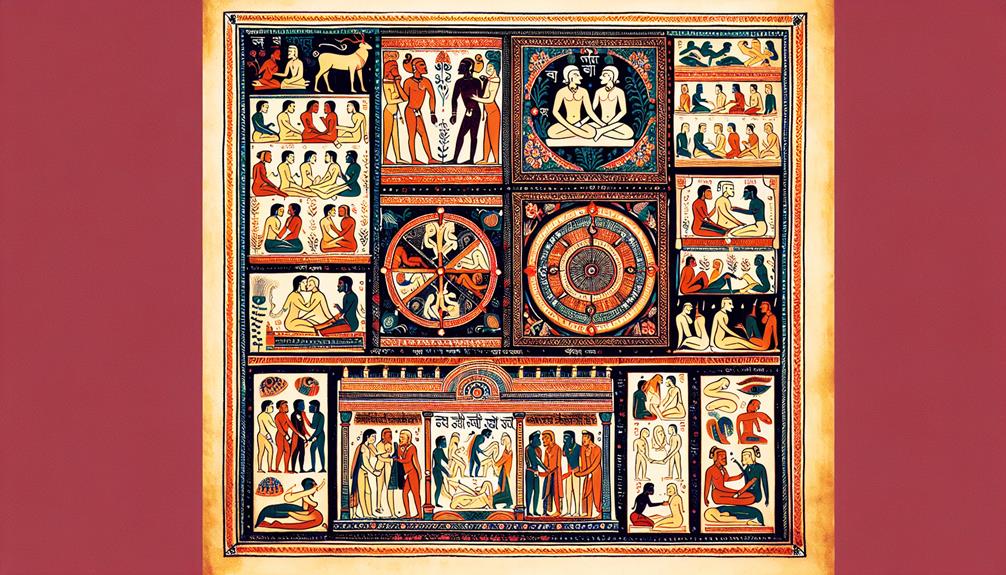Did Indians Write The Kama Sutra
Scholars have long debated the origins of the Kama Sutra, a text renowned for its detailed insights into human relationships and sexuality. As we explore the authorship of this ancient Indian treatise, various arguments surface, challenging conventional beliefs and shedding light on the complexities surrounding its creation.
Did Indians Write The Kama Sutra
The historical evidence and differing perspectives offer intriguing glimpses into the cultural landscape that birthed this influential work. By examining the cultural impact and global reach of the Kama Sutra, we may begin to unravel the mystery behind its creation, prompting a deeper exploration into the origins of this timeless guide.
Did Indians Write The Kama Sutra
Key Takeaways
- The Kama Sutra is believed to have originated in ancient India.
- Authorship is attributed to Vatsyayana, reflecting Indian cultural insights.
- Debate persists on whether the text was a collective effort.
- Regional variations in the text suggest diverse cultural influences.
The Origins of the Kama Sutra
The origins of the Kama Sutra can be traced back to ancient India, where it is believed to have originated as a text on the art of love and sexual practices. This ancient Indian text, attributed to Vatsyayana, is a comprehensive guide that covers various aspects of relationships, intimacy, and human behavior. The Kama Sutra delves into not only the physical aspects of love but also the emotional and psychological dimensions, emphasizing the importance of mutual respect and understanding between partners.
Did Indians Write The Kama Sutra
Within the context of Indian culture, the Kama Sutra holds significant value as a foundational text that explores the complexities of human relationships and sexuality. It provides insights into the art of seduction, the intricacies of courtship, and the role of sensuality in fostering intimate connections. By studying the Kama Sutra, individuals can gain a deeper understanding of the cultural norms and values that have shaped attitudes towards love and relationships in India for centuries.
Did Indians Write The Kama Sutra
Authorship Debate: Key Arguments
In the ongoing discourse surrounding the authorship of the Kama Sutra, various compelling arguments have emerged, shedding light on the intricate complexities of its origins. One key argument posits that the Kama Sutra was likely written by the ancient Indian philosopher Vatsyayana, who is often credited as its author. Supporters of this view highlight Vatsyayana's extensive knowledge of Indian customs, society, and philosophy, suggesting that he was well-positioned to compile such a comprehensive guide on relationships and human behavior.
Did Indians Write The Kama Sutra
On the other hand, some scholars challenge this traditional attribution, proposing that the Kama Sutra may have been a collective effort influenced by multiple authors over time. They argue that the text exhibits diverse perspectives and regional variations, indicating a collaborative composition rather than the work of a single individual. This debate underscores the enigmatic nature of the Kama Sutra's authorship, inviting further exploration and scholarly inquiry.
Did Indians Write The Kama Sutra
| Argument | Summary | Support |
|---|---|---|
| Vatsyayana as Author | Credits Vatsyayana for his knowledge and expertise | Extensive understanding of Indian customs and philosophy |
| Collective Authorship | Suggests the Kama Sutra was a collaborative effort | Diverse perspectives and regional variations in the text |
Historical Evidence and Perspectives
Amidst the ongoing debate surrounding the authorship of the Kama Sutra, exploring historical evidence and perspectives provides valuable insights into the origins of this renowned text. The Kama Sutra is traditionally attributed to Vatsyayana, an ancient Indian philosopher who is said to have compiled the teachings on love, relationships, and pleasure. However, the exact origins and authorship of the text remain shrouded in mystery, with varying opinions among scholars and historians.
Did Indians Write The Kama Sutra
Historical evidence suggests that the Kama Sutra was composed between the 3rd and 4th centuries CE in India, during a period of rich cultural and intellectual development. Some scholars argue that the text may have been influenced by earlier Indian traditions and texts on eroticism and relationships. Additionally, perspectives from different academic disciplines, including literature, history, and anthropology, offer diverse interpretations of the Kama Sutra's significance and cultural context.
Cultural Impact and Global Influence
Having permeated cultural narratives worldwide, the Kama Sutra has left an indelible mark on societal perceptions of intimacy and relationships. This ancient Indian text has not only influenced the way individuals approach physical intimacy but has also shaped broader societal attitudes towards love and relationships. Its impact goes beyond just sexual techniques, delving into the realms of emotional connection and spiritual harmony.
The global influence of the Kama Sutra can be seen in various aspects of contemporary culture, ranging from art and literature to popular media and advertising campaigns.
- Artistic Representation: The Kama Sutra has inspired countless artists, influencing depictions of love and sensuality in various art forms.
- Literary Influence: Writers around the world have drawn inspiration from the Kama Sutra, incorporating its themes of love and desire into their works.
- Sexual Revolution: The text played a role in challenging traditional views on sexuality and paving the way for more open discussions on intimacy.
- Cross-Cultural Adoption: The principles of the Kama Sutra have been embraced by individuals from diverse cultural backgrounds, highlighting its universal appeal.
Unraveling the Mystery: Final Thoughts
As we conclude our exploration of the cultural impact and global influence of the Kama Sutra, it is essential to reflect on the enduring mystery that surrounds this ancient Indian text. The origins of the Kama Sutra continue to intrigue scholars and historians, sparking debates about authorship and intent. While some argue for Indian authorship, others propose diverse cultural influences. Despite the uncertainty, one thing remains certain – the Kama Sutra's profound impact on society and its enduring legacy in shaping perceptions of love, relationships, and intimacy.
To summarize the key points discussed throughout our exploration, the table below provides a brief overview:
| Key Points | Implications | Relevance |
|---|---|---|
| Diverse cultural influences on the text | Raises questions about authorship | Highlights global connections |
| Impact on societal perceptions of intimacy | Shaping of cultural norms | Enduring influence on modern relationships |
| Ongoing debates about the Kama Sutra's origins | Scholarly interest | Cultural significance |
Frequently Asked Questions
How Has the Perception of the Kama Sutra Evolved Over Time in Indian Society?
The perception of the Kama Sutra has evolved over time in Indian society. It reflects changing attitudes towards sexuality, relationships, and cultural norms. Initially regarded as a comprehensive guide to a fulfilling life beyond just sexual practices, it has faced periods of censorship and stigma.
In modern times, there is a growing appreciation for its historical and cultural significance. Efforts are being made to reclaim it as a valuable part of India's heritage.
Are There Any Modern Adaptations or Reinterpretations of the Kama Sutra That Are Popular in India Today?
In modern India, there are numerous adaptations and reinterpretations of the Kama Sutra that have gained popularity. These contemporary versions often focus on fostering intimacy, communication, and exploring sexuality in a consensual and respectful manner.
Many individuals and couples find these modern adaptations to be helpful in enhancing their relationships and understanding of pleasure. The evolution of the Kama Sutra continues to influence Indian society's perspectives on love, relationships, and sexual well-being.
What Role Did Women Play in the Creation and Dissemination of the Kama Sutra?
In the creation and dissemination of the Kama Sutra, women played vital, albeit often overlooked, roles. Their contributions ranged from providing insights on intimate relationships to preserving and passing down the knowledge contained within the text.
Women's perspectives and experiences were instrumental in shaping the understanding and application of the Kama Sutra. Their involvement highlights the significance of gender diversity and inclusivity in the historical development of such texts.
How Has the Kama Sutra Been Received and Interpreted in Western Cultures Compared to Indian Culture?
The Kama Sutra has been perceived differently in Western cultures compared to Indian culture. In the West, it is often viewed through a lens of exoticism and eroticism, focusing on its sexual content.
In contrast, in Indian culture, the Kama Sutra is seen as a comprehensive guide to a fulfilling life, encompassing not only sexual practices but also relationships, aesthetics, and personal well-being.
These differing interpretations highlight the cultural nuances in how the text is received.
Are There Any Lesser-Known Texts or Historical Sources That Provide Additional Insights Into the Origins and Authorship of the Kama Sutra?
Delving into the origins and authorship of the Kama Sutra unveils a treasure trove of lesser-known texts and historical sources that offer fresh insights.
These sources, often tucked away from the limelight, provide a fascinating glimpse into the genesis of this renowned ancient Indian text.
Conclusion
In conclusion, the authorship of the Kama Sutra remains a complex and debated topic. Like a puzzle with missing pieces, historical evidence and perspectives offer insight into its origins, but the true creators may never be definitively identified.
Despite the mystery surrounding its inception, the Kama Sutra's cultural impact and global influence continue to resonate across time and space, transcending boundaries of tradition and modernity.

